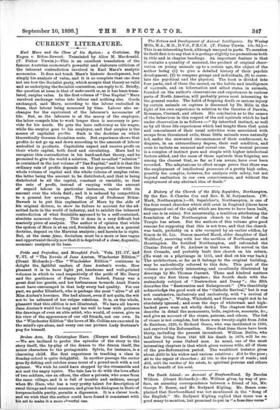The Nature and Development of Animal Intelligence. By Wesley Mills,
MA., M.D., D.V.S., F.R.C.S. (T. Fisher Unwin. 10s. 6d.)— This is an interesting book, although unequal in parts. To mention its fault first is to say that it is perhaps slightly too pretentious both in title and in chapter headings. An important feature is that it contains a quantity of material, the product of original obser- vation on young animals up to a certain age, the object of the author being (1) to give a detailed history of their psychic, development, (2) to compare groups and individuals, (3) to corre- late the psychical and the physical. The book is divided into four parts, and of these the second, on the habits and intelligence of squirrels, and on hibernation and allied states in animals, founded on the author's observations and experiences in various parts of North America, will probably prove most interesting to the general reader. The habit of feigning death or serious injury by certain animals on capture is discussed by Dr. Mills in the light of his own experience in relation to the theories of Darwin, Romanes, Czermak, and others. His conclusion as to the causes of the behaviour in this respect of the red squirrels which he had under observation is as follows :—" By inherited instinct, as well as by all those life experiences which had taught them that quiet and concealment of their usual activities were associated with escape from threatened evils, these little animals were naturally led, under the unwonted circumstances of their confinement, to disguise, in an extraordinary degree, their real condition, and even to imitate an unusual and unreal one. The mental process is a complex of instinct pure and simple with higher intellectual factors added, and the cases of these squirrels thus feigning are among the clearest that, so far as I am aware, have ever been recorded. The adaptations to effect escape prove that there was the employment of intellectual processes of a pretty high order, possibly too complex, however, for analysis with safety, but not beyond realisation in our own consciousness, and without the employment of any abstract idea of death."


































 Previous page
Previous page